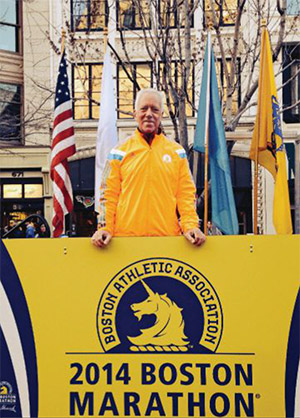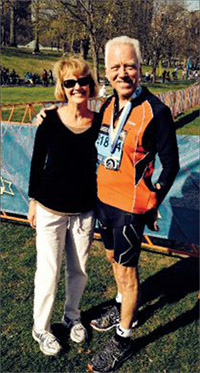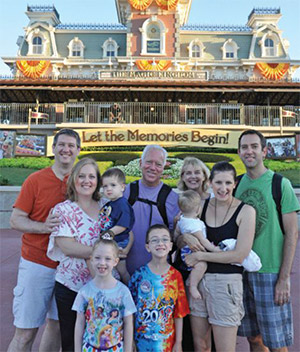Dan Murphy on Returning to Running After Prostate Cancer Treatment

Dan Murphy ran in the 118th Boston Marathon only 15 months after having a radical prostatectomy. From start to finish, Murphy refused to let prostate cancer be a hurdle in his path.
Murphy has been a dedicated runner since 1978. He started running to stay in shape while traveling for work. However, running was always about more than just exercise. Murphy’s morning runs allowed him to mentally prepare for the day. He said, “I’ve always viewed running as therapeutic. It’s a discipline that I’ve been able to reply upon to help me get done what I needed to get done—personally, as well as professionally.” This dedication also served him well after he was diagnosed with prostate cancer.
Prostate Cancer Diagnosis for a Runner
In the late summer of 2012, Murphy’s PSA was 7.25—high enough to concern Murphy and his doctor. However, Murphy was scheduled to run a marathon that October. He planned to use the race to qualify for the Boston Marathon. Murphy’s urologist in nearby Milwaukee, Wisconsin agreed to delay a biopsy until after the qualifying race.
The race took place in St. George, Utah. Murphy ran a fast marathon and successfully qualified for the Boston Marathon based on his age and gender.
However, in early November, he returned to the urologist and was diagnosed with progressive prostate cancer (Gleason score 8). Murphy said of the diagnosis, “This was very unexpected because I was religious about having annual PSA tests performed. The PSA values were trending up since 2008, but unfortunately, the internal medicine doctor I had at the time didn’t connect the dots.”
Murphy’s urologist used robotic surgery for his prostate cancer patients. Murphy was unsure whether this would be the best option for him. He investigated other routes, and a colleague suggested he see Dr. Catalona. Murphy took the advice. In early 2013, Dr. Catalona performed Murphy’s radical prostatectomy.
The Recovery

Dr. Catalona recommended that Murphy become mobile soon after surgery. This helped him recover. Murphy said, “My stance of overall fitness helped me really manage the post-operation steps. I was able to do all of the recommended protocols with no fear or trepidation, and the healing process happened on schedule as predicted and hoped for.” Murphy returned to work and began running at a low-impact level 1 month after his surgery. Murphy said, “I recovered very quickly. My body just cooperated.”
Since the surgery, he’s had quarterly PSA tests, all of which were undetectable.
A Runner’s Approach
Murphy’s approach to long- distance running helped him cope with prostate cancer. He focused on each short-term step. He said, “It helps to break this type of process into manageable pieces, whether it’s preparing for surgery or running a marathon. In running a marathon, successful runners never view completing the entire 26 miles in a singular context. They break it up into manageable segments, such as ‘I’m going to run 5 miles, then the next 5 miles, then I’ll run the next 5 miles.’ You never say, ‘I’ve got 26 miles to run’ and allow that to be your focus.”
The 118th Boston Marathon
Murphy has previously qualified for the Boston Marathon, but the marathon on April 21 was his first experience running in the race. He and his wife, Maureen, felt very welcomed by the city of Boston and encouraged by the 1.5 million spectators that lined the 26.2-mile course. Murphy said, “What compelled me to want to race in Boston was to be part of the very profound and inspirational race in 2014. It was apparent that the city of Boston—as well as the marathon participants— were determined that they would rejuvenate themselves from the tragedy of the 2013 bombings, and that the city could continue the healing process. I felt that a chapter was closed in a yearlong open book.”

Murphy’s running time in Boston was not as fast as it had been in previous marathons, but he felt a great sense of accomplishment. He said, “Things are not exactly the same from my physical and endurance perspectives, but things are good enough to allow me to complete a marathon. I was satisfied with that and regard the 2014 Boston as the most meaningful marathon that I’ve ever competed in.”
Looking Ahead
Murphy and his wife currently live in Delafield, Wisconsin. They have been married for 43 years and have three children and five grandchildren. He recently retired from Fiserv, a global technology provider serving the financial services industry. Murphy is taking advantage of his retirement and spending time with his family. He said, “I’m able to do all the things I did before [the surgery]. Maybe I’m not as fast running as I used to be, but I am enjoying it just as much.” In the future, he and Maureen hope to travel. “We’d like to see Tahiti, Norway and Italy,” Murphy said.
Staying healthy through disciplined fitness regimens remains important to Murphy. He is training for a triathlon and runs, swims and bikes regularly. He also runs with two of his grandchildren every Friday during an after-school health and fitness event. Murphy described this as a “treat” and is grateful for the opportunity to spend time running with them.




















